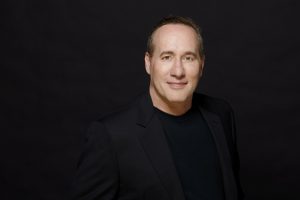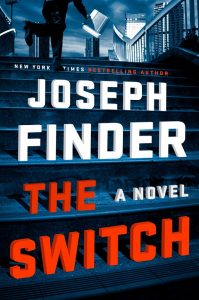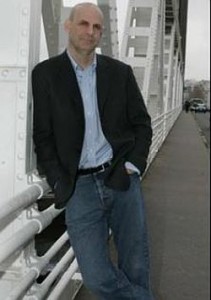 Joseph Finder is the bestselling author of thirteen previous novels, including The Fixer and Suspicion. Two bestsellers, Paranoia and High Crimes, became major motion pictures. His awards include The Barry, Gumshoe, and The International Thriller Writers Award. His new novel is The Switch.
Joseph Finder is the bestselling author of thirteen previous novels, including The Fixer and Suspicion. Two bestsellers, Paranoia and High Crimes, became major motion pictures. His awards include The Barry, Gumshoe, and The International Thriller Writers Award. His new novel is The Switch.
The Switch focuses on Michael Tanner, an ordinary guy whose marriage and business career are in trouble. Coming home to Boston from a business trip, he accidentally picks up the wrong Mac Book laptop after it passed through TSA screening. He doesn’t notice the mix-up until he arrives home, and when he sees its owner affixed a Post-It with a password, he opens the laptop, happy to be able to contact that person to correct the mix-up. But, by opening that laptop, his nightmare begins. He’s in possession of a U.S. senator’s laptop which contains “top secret” government files. Michael Tanner finds himself at the center of an extraordinary manhunt, and his entire life begins unraveling.
The Switch has a ‘ripped from the headlines’ quality, yet veers in its own unique direction. What role do current events play in your conception of thrillers?
I think thrillers play upon the ambient anxieties in our society. You can write a thriller having nothing to do with the headlines, but it will still have some relationship to what’s going on in our culture.
I was writing The Switch during the 2016 presidential campaign at the time Donald Trump was lambasting Hillary Clinton. I didn’t finish writing the book until after the election, and I suddenly realized I was writing a conspiracy novel during a conspiratorial age—with the issue of Russia having hacked into and having tried to interfere with our electoral process. While not all of my books are ‘ripped from the headlines,’ this one was and it felt like it was appropriately so.
How did this idea of a mistaken switch of laptops occur to you?
I was on a book tour and grabbed my Mac Book Air when it came out of the X-ray machine. I stopped and realized it was someone else’s. So, I thought, ‘What would have happened if I’d grabbed the wrong laptop?” Probably not much. It would have involved a hassle, but it wouldn’t have been a big deal. I then thought, ‘What if this was a laptop belonging to someone important and there was something on it? At that point, my twisted mind kicked in and I had a story.
You once said, ‘The daily news brings me stories I could never use in a book, because nobody would believe them. Fiction has to make sense. Real life doesn’t.’ Tell us more about that.
In our increasingly conspiratorial age, countless political conspiracy theories float everywhere. This is the kind of story I wouldn’t make up; it just seems too far-fetched. Basically, a thriller is about the restoration of order. There’s a tear in the fabric of someone’s life and it’s mended by the end of the novel. The story must make sense. It cannot be about an open-ended conspiracy. Reality doesn’t have to make sense in a way that fiction must make sense. That may be one of the reason we read fiction—it’s a way of processing our fears and worries, and coping with them.
Many of your novels deal with government agencies and corporate conspiracies. How did you develop an interest in these issues?
I came very close to joining the CIA. I have friends who work there—friends I really admire—and I must say, I always read Robert Ludlum novels, which helped foster my interest in these things. Robert Ludlum’s novels were always about large conspiracies. In general, I’m not a conspiracy theorist, I’m a conspiritologist. I’m interested in the study of conspiracy and what it does to people. I actually don’t believe in conspiracies to the extent that many people do because I think government people involved in conspiracies are unable to keep a secret. The notion of conspiracies is an interesting way of looking at the world. I was trained as a Sovietologist, and I think understanding the way the Kremlin works is an exercise in conspiracy theory.
Despite his flaws, Michael Tanner in The Switch is a very likable protagonist. What do you think makes him so appealing?
He’s an entrepreneur, yet he lacks the killer instinct. I set the novel up so that it’s Tanner versus someone in the government. One has too much ambition, and the other lacks the killer instinct. I think Michael Tanner is appealing because he’s a happy-go-lucky and easily-relatable person. He loves his work and wants to save his coffee business, even though he’s struggling to survive.
Another thing that makes him likable is he begins to adapt to his insane circumstances. He gets better and better at negotiating the rigors of the virtually impossible dilemma in which he finds himself immersed.
The prose in The Switch is straightforward, very readable, and quite powerful. How would you describe your writing style?
I find prose very important when I read. It’s difficult for me to read badly-written novels. I feel that just because I’m writing something considered popular entertainment, doesn’t mean the prose can be lazy or predictable. I write as directly as possible, yet I try to make sure the words I choose are apt, the expressions are not clichés. I’m telling a story but I don’t want the prose to get in the way. I don’t want the reader to notice how ‘beautiful’ it is. I want it to be invisible, but good.
Your first novel, The Moscow Club, was published when you were twenty-three years old and still a student at Harvard. I know there’s an interesting story behind it. Will you share it with us?
The Moscow Club began as a non-fiction book. I’d learned Armand Hammer, the CEO of Occidental Petroleum, had connections with Russia’s KGB. But there were things I couldn’t put in a non-fiction book because I couldn’t completely nail down the facts. So instead, I decided to write a novel in which an Armand Hammer-like character was featured. As fiction, I could say whatever I wanted.
Armand Hammer was very unhappy about the book. His lawyer, Louis Nizer, published an Op-Ed piece in the New York Times threatening a libel lawsuit against the publisher. But Hammer couldn’t sue because he would never want to go through the discovery process. Instead, he called Harvard and tried to have me expelled. He really went after me. It was very scary.
When the book came out, Hammer bought up as many copies as he could to take the book off the market. So, thanks to him, in the end, the book sold very well. [Laughter].
Is there anything about your writing process that might surprise our readers?
I spend a lot of time doing research. While I’m talking to people as part of my research, I get plot ideas from talking to them. So, even though I’m doing research, I’m also plotting the narrative arc at the same time. My discussion with a CIA or an ex-CIA operative may generate a good idea for a scene or plot twist. In a sense, I come up with my characters by talking to real characters.
What’s coming next from Joseph Finder?
I’ll be writing a Boston-based standalone with a female protagonist.
Congratulations on writing The Switch, a gripping thriller that makes you feel every emotion and rams home the realization of how flimsy the predictability of life can be.





